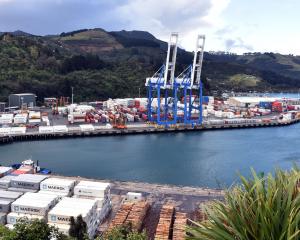The Otago Regional Council has upheld its recommendation that Port Otago's dredging and disposal consents be granted but it has suggested amendments and added conditions to ensure its effects are more tightly controlled, Otago Regional Council senior resource officer Suzanne Watt says.
In the final day of the port company's resource consent hearing in Dunedin yesterday, Mrs Watt presented the council's staff report, and Port Otago gave its right of reply after the final submitters gave their evidence.
The panel adjourned yesterday to consider the evidence and submissions made during the 12-day hearing. It would take 10 days to ensure it had the information it needed before taking up to 15 days to write its decision.
Port Otago yesterday waived its entitlement to a hearing fee discount if the statutory timeframe was not met, acknowledging Easter and the amount of information the panel had to absorb.
Panel chairman John Lumsden said the panel would do its best to complete its decision in the timeframe but acknowledged arriving at a robust decision in such a case required a little bit more thought and effort to ensure everyone's concerns were dealt with.
The panel could apply to extend the time needed for a decision if required.
Mrs Watt said there needed to be a good level of certainty for specific activities or monitoring to provide a degree of confidence that potential effects would be adequately monitored. Monitoring of the dredge spoil activities was a crucial aspect of consent for the activity, she said.
"It is clear . . . there will be effects as a result of the deposition [of spoil]. What is in contention is the nature and scale of the effects and whether the scientific research will be found to be an accurate representation of the actual effects."
Bathymetric surveys should be taken during and immediately following the major capital dredging and disposal activities at a minimum of every three months and continue annually for three yeas after the capital dredging had ended, she said.
Mrs Watt supported the majority of conditions that had been agreed to by the Department of Conservation and Port Otago as well as suggestions by others for Manawhenua consultative group, and project and technical consultative groups.
As for the noise issues raised by many submitters, the Otago Regional Council did not have jurisdiction to consider the effects of noise occurring outside the coastal marine area, Mrs Watt said.
"For the extension of the multipurpose wharf, the consents, if granted, would be consenting and restricting only the noise generated during construction."
The operational use aspects raised through the consent process were covered by the Dunedin City Council's district plan.
The use of dredge spoil was also not within the scope of the hearing, but no restrictions on the company's ability to use the spoil for other purposes had been imposed, she said.
She also warned that there were additional consents which had not been applied for, to move navigation beacons and for turbidity meters, that would be needed for some of the work to go ahead.
Port Otago general manager infrastructure Lincoln Coe said in his supplementary evidence Port Otago would keep an open mind about alternative methods of dredge material disposal.
The harbour islands proposal would be a significant and "potentially" contentious undertaking with its own engineering and environmental issues as well as requiring its own resource consents.
The formation and inclusion of a technical group to support the environmental management plan was an important step in providing openness and transparency to the monitoring, review and updating of the plan, Mr Coe said.
Port company counsel Len Andersen said the comprehensive conditions proposed, coupled with the environmental management plan (EMP) and adaptive management philosophy they embodied, provided the community with ongoing access to information and the opportunity for further input.
The major concerns raised by submitters are that unforeseen effects are dealt with not only by the adaptive management provisions in the EMP but also by the oversight provided by the technical group.
Port Otago hearing
Panel: John Lumsden (chairman), Hugh Leersnyder, Dr Mike Johnston.
Proposal: Upgrade channel berth and swinging areas disposing 7.2 million cu m of spoil at sea. Extend multipurpose wharf by 135m. Construct fishing wharf at end Boiler Pt walkway.
Where: Otago Regional Council, Dunedin.
Day 12: Submitters evidence
Giving evidence yesterday: South Coast Board Riders counsel Brett Gray, past-president Brett Hastie and former national champion Graham Carse, Surfbreak Protection Society Nicola Reeve, Port Chalmers Naomi Wilson, Careys Bay residents Kris Nicolau and Chris Hilder (read by Ms Nicolau).
Otago Regional Council staff report: Suzanne Watt.
Port Otago right of reply: Counsel Len Andersen, general manager infrastructure Lincoln Coe.
Quote of day: Most importantly that if effects are occurring, that mitigation is in place immediately to protect the natural and human use values of the Otago Harbour and Otago coastal environment. - Suzanne Watt Otago Regional Council





